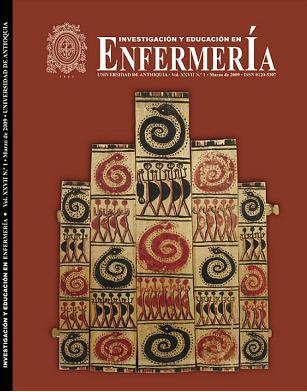THE ADAPTATION PROCESS OF BREAST CANCER WOMEN
DOI:
https://doi.org/10.17533/udea.iee.2834Keywords:
breast neoplasms, neoplasms, adaptation, social supportAbstract
Objective: discover the process of adaptation to their new life conditions and state of health within a sociocultural context.
Methodology: qualitative study supported in the Founded Theory by means of in depth interviews to a sample of twenty resident women who received treatment for breast cancer in the city of Medellín, Colombia from 2005 to 2007.
Results: the reach of the analysis allowed establishing a conceptual order, showing a process of adaptation in four stages, denominated thus: 1. Discovering the disease, 2. Accepting the disease, 3. Overcoming disease, and 4. Adapting to a new body and a new life.
Conclusions: the adaptation of the breast cancer women with breast cancer is a complex process because they must face continuously the multiple imbalances that affect their emotional, physical, mental and social dimensions
Downloads
References
(1) Ferlay J, Bray F, Pisani P, Parkin DM. Cancer incidence, mortality and prevalence worldwide [CD-ROM]. Lyon: IARC Press; 2004.
(2) Dirección Seccional de Salud de Antioquia. Registro poblacional de cáncer de Antioquia: Situación actual del registro poblacional de cáncer de Antioquia. Medellín: DSSA; 2005. p. 1-5.
(3) Offit K, Pierce H, Kirchhloff T, Kolachana, Rapaport B, Gregersen P, et al. Frequency of CHEK2*1100delC in New York breast cancer cases and controls. BMC Med Genet. 2003;4(1):1-4.
(4) Arpino G, Bardou VL, Clark GM, Elledge RM. Infiltrating lobular carcinoma of the breast: tumor characteristics and clinical outcome. Breast Cancer Res. 2004;6(3):149-56.
(5) Pedro L. Quality of life long term survivors’ cancer: influencing variables. Cancer Nurs. 2001;24(1):1-11.
(6) Fiedman L, Wyatt G. Long- term female cancer survivors: quality of life issues and clinical implications. Cancer Nurs. 1996;19(1):1-7.
(7) Wyatt G, Kurtz M, Liken M. Breast cancer survivors: exploration of quality of life issues. Cancer Nurs. 1993;16(6):440-48.
(8) Kesler T. Contextual variables, emotional state, and current and expected quality of life in breast cancer survivors. Oncol Nurs Forum. 2002;29(7):1109-16.
(9) Protheroe D, Turvey K, Horgan K, Benson E, Bowers D, Ho A. Stressful life events and difficulties and onset of breast cancer: a case control studie. BMJ. 1999;319:1027-30.
(10) Boehmke M. Measurement of symptom distress in women with early- stage breast cancer. Cancer Nurs. 2004;27(2):144-52.
(11) Ali N, Khalil H. Identification of stressors, level of stress, doping strategies, and doping effectiveness among Egyptian mastectomy patients. Cancer Nurs. 1991;4(5):232-9.
(12) Landmark B, Strandmark M, Wahl A. Living with newly diagnosed breast cancer, the meaning of existential issues. Cancer Nurs. 2001;24(3):220-6.
(13) Knobf T, Sun Y. A longitudinal study of symptoms and self care activities in women treated with primary radiotherapy for breast cancer. Cancer Nurs. 2005;28(3):210-8.
(14) Mast M. Correlates of fatigue in survivors of breast cancer. Cancer Nurs. 1998;21(2):136-42.
(15) Bjorkf E. Icelandic women ́s identifications of stressors and social support during the diagnostic phase of breast cancer. J Adv Nurs. 1997;25(3):526-31.
(16) Palson MB, Norberg A. Breast cancer patient’s experiences of nursing care with the focus on emotional support: the implementation of a nursing intervention. J Adv Nurs. 1995;21(2):277-85.
(17) Lindop E, Cannon S. Evaluating the self-assessed support need of women with breast cancer. J Adv Nurs. 2001;34(6):769-70.
(18) Degner L, Hack T, O ́Neil J, Kristjanson L. A new approach eliciting meaning in the context of breast cancer. Cancer Nurs. 2003;26(3):169-78.
(19) Pryds K, Petterson S, Segesten K. The meaning of not living. Cancer Nurs. 2000;23(1):6-11.
(20) Krouse H. Cancer as crisis: the critical elements of adjustment. Nurs Res. 1982;31(2):96-101.
(21) Lavery J, Clarke V. Causal attributions, coping strategies, and adjustment to breast cancer. Cancer Nurs. 1996;19(1):20-8.
(22) Hertzler J. Society in action. A study of basic social processes. New York: The Driden Press; 1954. p. 62-63.
(23) Bonilla E, Rodríguez P. Más allá del dilema de los métodos. México: Norma; 1997. p. 47, 93.
(24) Strauss A, Corbin J. Bases de la investigación cualitativa: técnicas y procedimientos para desarrollar la teoría fundamentada. Medellín: Universidad de Antioquia; 2002. 341 p.
(25) Barron A. Apoyo social: aspectos teóricos y aplicaciones. Madrid: Siglo XXI; 1996. p. 3-27.
(26) Mishel HM. Incertidumbre en la enfermedad. Rev Imag. 1988;20(4):225-32.
(27) Lazarus R, Folkman S. Estrés y procesos cognitivos. Barcelona: Martínez Roca; 1986. p. 263.
(28) Halldórsdóttir S, Hamrin E. Experiencing existential changes: the lived experience of having cancer. Cancer Nurs. 1996;9(1):29-36.
(29) Ferrel B, Grant F, Funk B, Otis S, García N. Quality of life breast cancer. Pat II. psychological and spiritual well- being. Cancer Nurs. 1998;21(1):1-9.
(30) Vanistendael S, Lecomte J. Resiliencia y sentido de vida. En: Melillo A, Suárez E, Rodríguez D, compiladores. Resiliencia y subjetividad. Los ciclos de la vida. Buenos Aires: Paidós; 2004. p. 90-101.
(31) Max-Neef M, Elizalde A, Hopenhayn M. Desarrollo a escala humana: una opción para el futuro. Chile: Fundación Dag Hammarskjold; 1992. p. 34.
(32) Hartmann H. La psicología del yo y el problema de adaptación. México: Paidós; 1987. p. 2, 42
Downloads
Published
How to Cite
Issue
Section
License
Derechos de propiedad / Direitos de Propriedade
English: If the article is accepted for publication, all copyright will be of exclusive property of Investigación y Educación en Enfermería. The text and the graphics included in the publication are exclusive responsibility of the authors and not necessarily reflect the thought of the Editorial Committee.
Español: Si el artículo es aprobado para publicación, todos los derechos son de propiedad de Investigación y Educación en Enfermería. El texto y las gráficas incluidas en la publicación son de exclusiva responsabilidad de los autores y no necesariamente refleja el pensamiento del Comité Editorial.
Português: Se o artigo for aceito para publicação, todos os direitos autorais serão de propriedade exclusiva de Investigación y Educación en Enfermería. O texto e os gráficos incluídos na publicação são de responsabilidade exclusiva dos autores e não refletem necessariamente o pensamento do Comitê Editorial.















